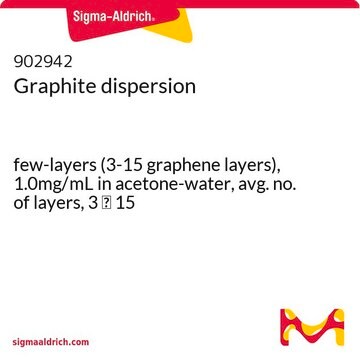495425
Gallium–Indium eutectic
Ga 75.5% / In 24.5%, ≥99.99% trace metals basis
Synonym(s):
EGaIn
About This Item
Recommended Products
Assay
≥99.99% trace metals basis
form
liquid
composition
Ga 75.5% / In 24.5%
mp
15.7 °C (lit.)
density
6.25 g/mL at 25 °C (lit.)
SMILES string
[Ga].[In]
InChI
1S/Ga.In
InChI key
SPAHBIMNXMGCMI-UHFFFAOYSA-N
General description
Application
Features and Benefits
- Increase Power Performance: Its high thermal conductivity makes it a high-performing thermal interface material for increased power performance in electronics.
- Simplify Electrical Contact: Its excellent electronic conductivity, conformal shape, and self-healing properties make it easy to make electrical contact for devices and molecular electronics
- Robust Contact: This material conforms to irregular shapes, making it perfect for use in soft robotics and stretchable electronics as a flexible conductor and robust contact.
Signal Word
Danger
Hazard Statements
Precautionary Statements
Hazard Classifications
Acute Tox. 4 Oral - Aquatic Chronic 3 - Met. Corr. 1 - STOT RE 1 Inhalation
Target Organs
Lungs
Storage Class Code
6.1D - Non-combustible acute toxic Cat.3 / toxic hazardous materials or hazardous materials causing chronic effects
WGK
WGK 3
Flash Point(F)
Not applicable
Flash Point(C)
Not applicable
Personal Protective Equipment
Certificates of Analysis (COA)
Search for Certificates of Analysis (COA) by entering the products Lot/Batch Number. Lot and Batch Numbers can be found on a product’s label following the words ‘Lot’ or ‘Batch’.
Already Own This Product?
Find documentation for the products that you have recently purchased in the Document Library.
Customers Also Viewed
Our team of scientists has experience in all areas of research including Life Science, Material Science, Chemical Synthesis, Chromatography, Analytical and many others.
Contact Technical Service
















![Poly[(p-phenylenevinylene)-alt-(2-methoxy-5-(2-ethylhexyloxy)-p-phenylenevinylene)]](/deepweb/assets/sigmaaldrich/product/structures/147/963/61b421da-530b-4acf-8851-ecb9492e90ba/640/61b421da-530b-4acf-8851-ecb9492e90ba.png)